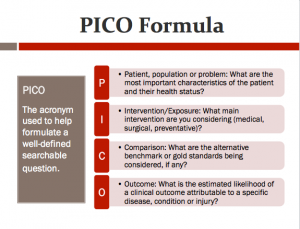Research Questions/PICO/Hypotheses
Partido, B.B.
There are three types of research questions:
- Descriptive.When a study is designed primarily to describe what is going on or what exists. Opinion polls that seek only to describe the proportion of people who hold various opinions are primarily descriptive in nature. (i.e. If we want to know what percent of dental hygiene students read their research textbooks, we are simply interested in describing something.)
- Relational/Correlational. When a study is designed to look at the relationships between two or more variables. (i.e. An opinion poll that compares what proportion of dental hygiene students read online textbooks versus printed textbooks.)
- Causal.When a study is designed to determine whether one or more variables causes or affects one or more outcome variables. (i.e. If we studied dental hygiene students to determine if providing an online and free research textbook (cause) would lead to increased reading of the textbook (effect).)
The PICO question allows the clinician to determine the most important issue or outcome to explore, facilitates the literature review process, and requires a clear understanding of the problem, results, and outcomes related to the patient’s problem.
PICO stands for:
- (P) Patient and/or problem
- (I) Intervention
- (C) Comparison
- (O) Outcomes
In order to write a PICO question, the following formula can be used:
For a patient with (P-specific problem/population), will (I-what you plan to do), compared to (C-main alternative/gold standard) result in (O-measurable results that solve the problem)?
EXAMPLE:
For a patient undergoing (P) head and neck cancer radiation therapy, will (I) fluoride treatments pre-therapy and post-therapy , as compared to (C) fluoride treatments only post-therapy , be more effective in (O) reducing the risk of xerostomia and caries?
There are three types of hypotheses:
Null hypothesis: There is NO difference between the intervention and the comparison (alternative/gold standard).
Alternate hypothesis (non-directional): There IS a difference between the intervention and the comparison (alternative/gold standard)
Alternate hypothesis (directional): The intervention will provide a increased or decreased outcome when compared to the comparison (alternative/gold standard).